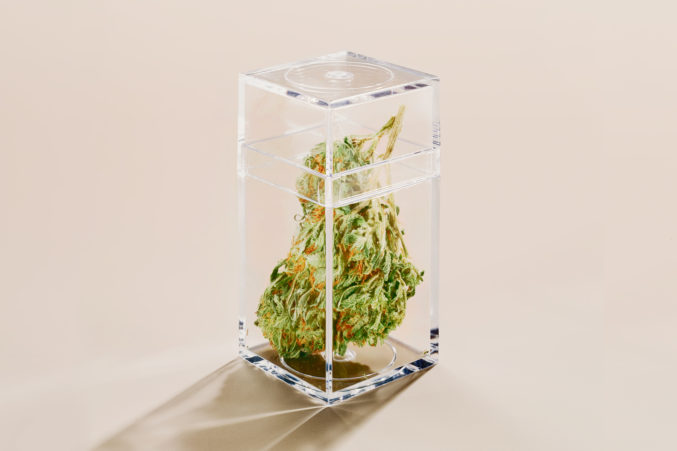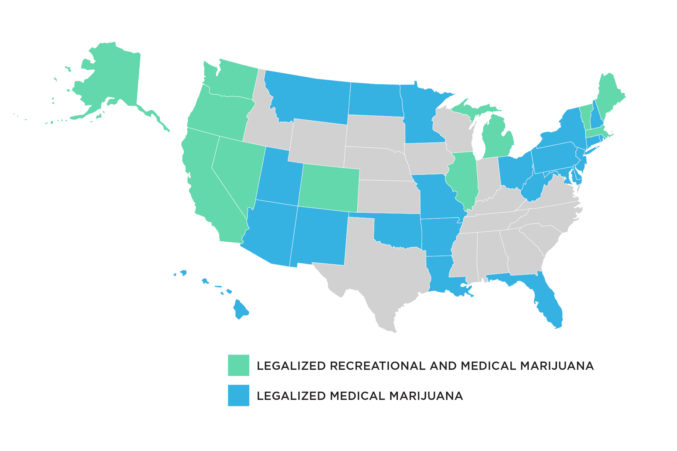
The blossoming medicinal cannabis market gets a boost from Texas lawmakers.
By
Will Maddox
Texas is one step closer to joining the 34 states where
medicinal marijuana is legal after state legislators passed a law
written by North Texas Republican representative and registered nurse
Stephanie Klick to expand the conditions that can be treated with
medicinal cannabis. Although the law narrowly defines which conditions can be treated with medicinal marijuana, it is a significant expansion.
Five years ago, Klick authored the first
Compassionate Use Act, which said that medicinal marijuana administered
via oil or inhaler could treat only those with intractable epilepsy. The
new bill expands access to patients with terminal cancer, multiple
sclerosis, Parkinson’s disease, ALS, autism, and other seizure
disorders, allowing them to be treated with THC, the main psychoactive
compound found in marijuana. The expanded diagnoses could mean an uptick
for the small but growing cohort of growers, providers, and retail
businesses in the THC and CBD markets.
Morris Denton is the CEO of Austin-based Compassionate
Cultivation, one of just three state-licensed companies that grow
cannabis, and he says the new law will have a major impact on the number
of patients covered and the physicians who treat them. He estimates
there are around 150,000 patients with intractable epilepsy in the
state, but the new bill could expand the THC patient base to more than a
million. “It will give doctors and patients more in the playbook,”
Denton says.
“They want to be able to have as many different options as
they can.”
Compassionate Cultivation is a manufacturer of THC and CBD
products that grows the plants, processes the chemicals, packages, and
distributes the medicines and oils from their facility. It was the first
dispensary in Texas to provide medical cannabis to a patient under the
newly expanded conditions—an Austin woman being treated for
non-Hodgkin’s lymphoma—and legislation is paving the way for their
growth.
A Natural Alternative
Dallas physician Dr. Mary Caire’s
understanding of medicine and the use of nonpharmaceutical medicines has
changed with the times. After a double residency in physical medicine
and rehabilitation and internal medicine, she grew her practice to
include functional medicine, seeing the importance of diet, hormones,
and other natural substances to better treat chronic conditions.
Caire practices with LifeSpan, a preventive, integrative
medicine practice in Dallas, and has seen the impacts of medicinal THC
on her patients. A woman with lymphoma who was receiving aggressive
chemotherapy was having difficulty staying hydrated and getting proper
nutrition while undergoing treatment because of the nausea caused by the
chemotherapy. She was also experiencing pain and fatigue. “She got
everything traditional medicine had to offer and it failed,” Caire says.

When the new law passed, Caire began to
prescribe oil with THC for the woman, and she saw many of the negative
symptoms subside. THC improved the patient’s appetite and reduced the
pain, and the improved nutrition allowed the chemotherapy to have a
greater impact. Not only does THC help treat patients suffering from
grave conditions, it can be used for pain and replace addictive opioids.
The patient’s most recent scan revealed positive steps toward recovery.
While the legislation is a move in the right direction,
Caire thinks more flexibility is needed to best address patients’ needs.
“We are being told by the legislature with no medicinal experience how
much of certain compounds we can use because they want to have some
control over the amount that is prescribed,” she says. “We need the
flexibility to compound it for their needs. The people who know what is
best for that patient are the physician and the patient.”
Thinking Green
Texas remains behind many other states
when it comes to the legalization of medicinal cannabis with THC, but it
is home to a booming market for CBD oil, which extracts the
cannabinoids from hemp and marijuana. Another law passed this summer
adds clarity to which CBD products are legal in Texas. Hemp Business
Journal reports that the CBD market will grow from an estimated $202
million in 2017 to $2.1 billion in 2020, but because there is a lack of
clarity about whether CBD is a medicine, dietary supplement, or food
supplement, oversight of these products leaves providers and retailers
wanting standardization.
Co-owners of retail chain CBD Kratom David Palatnik and
Dafna Revah run 33 locations nationwide and six in DFW, and agree with
the need for more rules. They have their own rigorous lab standards and
would embrace additional oversight. “We would like to have industry
standards across the board that everyone follows,” Platanik says.
“Medical professionals will feel better about recommending it.”
There is still a long way to go for Texas to catch up with
the rest of the country in the use, regulation, and legalization of
medicinal marijuana and other products, but expanded future looks
inevitable.
For those treating patients who could benefit from added
legalization, the transition can’t come soon enough. “I think we need to
change the conversation and be open-minded,” Caire says. “We took an
oath that we would do the best we can, do no harm, and put the patients’
interest first. This substance meets all the criteria that we strive
for with our patients.”

No comments:
Post a Comment